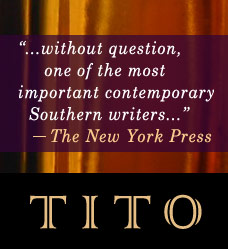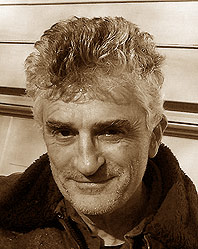Mike Tuggle reviews Tito Perdue's REUBEN
Starry-Eyed Varlet

Tito Perdue is a self-described “problematic author” and “cultural reactionary.” His novels are bitter and amusing accounts of a Western civilization that seems hell-bent on suicide. But that culture is haunted by Perdue’s literary alter ego, Lee Pefley, a man who acts as both a Jeremiah and cultural guerilla fighter.
Pefley’s sorties apparently arise out of pure outrage, with no greater aim than to verbally or physically pummel his targets. But there’s more to Pefley’s often violent outbursts than expressions of rage. I think Derek Turner of the Quarterly Review was on to something when, commenting on Tito Perdue’s works, he observed that “the most misanthropic, the most ‘irrelevant’ and ‘out of touch’ may secretly be the greatest idealists of all.” In his many battles, Lee Pefley confronts the remnants of Western civilization with blunt reminders of what it used to be. His goal is both outrageous and reactionary: to rekindle a dying flame.
In Reuben, Lee Pefley is facing eternity after a lifetime of living by his own stern code of honoring the best of Western civilization and refusing to buckle under to the barbarians that seek its demise. But Lee has one last trick up his sleeve. He takes in a diamond in the rough named Reuben and whips the young man into shape physically and mentally. Armed with Pefley’s greatest weapons, his numerous hates and lengthy reading list, young Reuben goes out to “conquer the world” – or at least “the occidental share of it.”
After run-ins with the police, Reuben manages to find a job and secure a formal education. He gains admission to the California Institute of Technology, which turns out to be “good for his career and bad for everything else.”
That line was written by someone familiar with the scam of higher education in contemporary America.
It’s a depraved world Reuben takes on. While residing in California, the simple act of reading the daily news, with reports of “how a homosexual was offended in South Dakota,” and that marriage has been expanded to include unions of more than two people, makes him vomit.
Here’s how the author describes the sunken state of life in the America of the near future:
A golden age of cretinism, followed closely by hydrocephaly, congenital schizophrenia, and other concomitants of final decadence. It was as if viruses and bacteria had found the specific weaknesses of a people given over heart and soul to equality, the most fatal of social memes. Or rather, it was the worst people who now were deemed the best, as testified by newspapers and television.But Reuben has been prepared by a master fighter to strike back at this mad world. As Hunter S. Thompson would say, “When the going gets weird, the weird turn pro.” And that’s exactly what Reuben does, turning the system’s own irrationality against it. When he encounters irresponsible and degenerate individuals, Reuben uses his massive physical strength to dole out punishment in the form of cartoonish violence. Such behavior earns Reuben various epithets: scoundrel, varlet, vagrant, knave, miscreant.
In between thrashings, Reuben helps organize and lead a circle of fellow reactionaries, and primes the pump of counterrevolution through a series of bizarre investments, including a “highly leveraged program of short-selling the country’s art market index fund.” Reuben manages to slowly gain access to the machinery of power. One of his reforms is to eliminate the country’s excessive supply of schools. This has a benign and surprisingly quick payoff: “Now, almost at once, the country became more cheerful, the result of young people’s rescue from the sneers and curdled sophistication that came from imagining they had acquired an education.”
Reuben, with his clear vision of what he wants, his boundless energy, and ability to raise billions by manipulating individuals and institutions too corrupt and enfeebled to know better, successfully kicks off an “invisible revolution.” To restore Western civilization, he has Wagnerian opera houses built, brings back classical music, and places limits on the amount of television that can be broadcast. In the end, Reuben manages to wean people of their addiction to indulgence and boredom and prod them back onto their front porches and yards.
By the end of his life, Reuben has pretty much realized Lee Pefley’s quest. He gives Western civilization a fighting chance by punishing or exiling those who sought to wreck it, and reforming the economy and culture to support a livable, more humane, more noble country.
Tito Perdue has a wicked sense of humor and a stinging style of writing that had me thinking and chuckling as I read it. It’s better than Confederacy of Dunces, with a much more manly and unpredictable protagonist.








